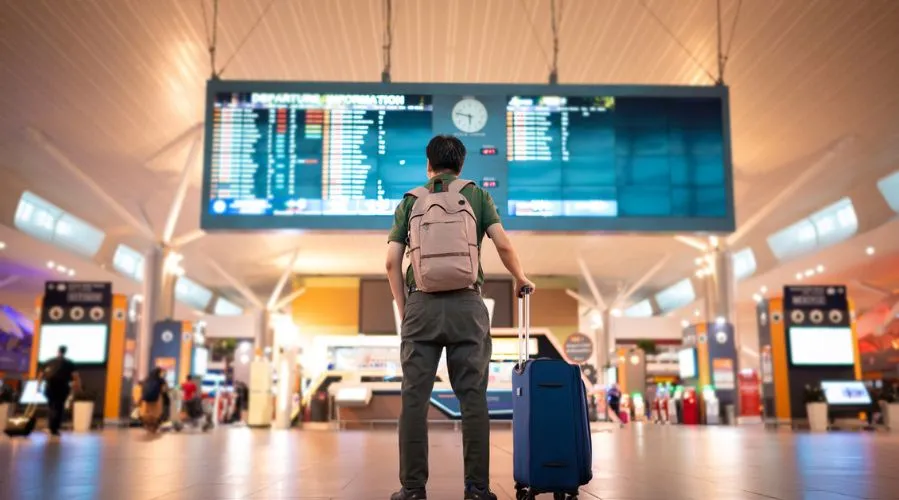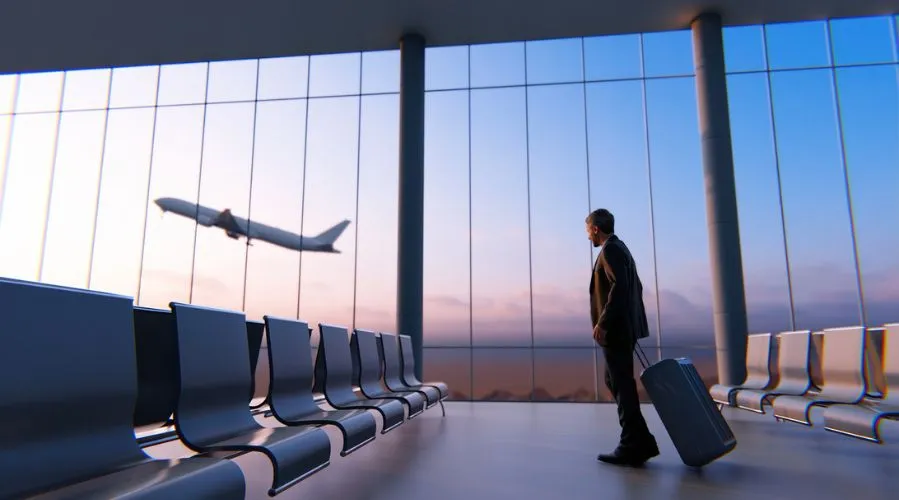NAME: Axel Strauss
DATE: 03/03/2025
The capital city of Lithuania Vilnius is both a UNESCO World Heritage site and one of the greenest cities in Europe. And, perhaps more importantly, it’s also one of the few capitals in the world that allows hot air balloons to fly over it! Moreover, the endless wonders of Lithuania itself are quickly rising to the top of the list of top European destinations for travelers the world over too.
And if you’re also planning a trip to this central European gem any time soon, having the proper travel insurance is probably a good call — even if you’re not planning on leaving the ground much while there. Fortunately, AXA has all you need to know about how to choose the right travel insurance for Lithuania below.
- Is travel insurance mandatory for Lithuania?
- I don’t need a Schengen Visa. Do I still need travel insurance?
- What does AXA Schengen travel insurance for Lithuania cover?
- What should I do if I am injured or ill while in Lithuania?
- What else should I know when prepping for my trip to Lithuania?
Is travel insurance mandatory for Lithuania?
Maybe. That is, Lithuania's requirements for travel insurance depend on your citizenship, your current paperwork, and where you’re coming from. That’s because the Republic is one of three Baltic states that help make up the current members of the Schengen Zone. And like all its Schengen neighbors, it thus requires most of its visitors to obtain aSchengen visa for stays up to 90 days.
One of the requirements for securing a Schengen Visa, meanwhile, is having the proper travel insurance. We'll delve deeper into what “proper” means here shortly. But first, here’s a quick breakdown of who does and doesn’t need a Schengen visa for Lithuania.
Who needs a Schengen visa for Lithuania?
You will need a Schengen visa — and, therefore, travel insurance — to go to Lithuania if you’re a national of any African, most Middle Eastern nations, China, India, Russia, and nearly a hundred more countries. The reason is that these countries have not as of yet signed a visa waiver agreement with the Schengen zone and the EU.
Fear not though, because AXA has all you need to know about how to apply for a Schengen visa.
Who does not need a Schengen visa for Lithuania (for stays of less than 90 days)?
Meanwhile, you can go to Lithuania Schengen-visa-free if you are:
-A citizen of a non-EU country (and/or territory) that has signed a visa exemption agreement with the EU. And this includes passport holders from Australia, Brazil, Canada, Hong Kong, Japan, Mexico, the U.K.,* the U.S., and roughly 50 more nations.
-A national of the Schengen area and/or one (or more) of the European Union member countries.
*NOTE: If you have a U.K BRP (i.e., biometric residence permit) and/or IRL (i.e., indefinite leave to remain), then whether you need a Schengen visa or not depends on whether the country where you hold citizenship has signed a visa-free travel agreement with the Schengen Area. Consult the UK Government’s Official Website’s Travel to the EU/Schengen section, the Official Website of the EU, and that of your home country for more details on that.
PRO-TIP: The European Commission provides full lists of countries exempt from/requiring a Schengen visa.
And if you’re still not sure, AXA can help you figure out whether you need a Schengen visor or not too.
I don’t need a Schengen Visa. Do I still need travel insurance?
Travel insurance is not mandatory for Lithuania if you don’t need a Schengen Visa. However, a trip abroad is generally full of surprises — usually good, but sometimes bad. And no matter your destination, your health and safety — and those of your loved ones — should always be your first priority. And the best way to prioritize your health and safety is by being properly insured.
Moreover, medical costs abroad — especially when it comes to things like prescription drugs — can be surprisingly high. And while Lithuania does offer free basic healthcare to EU citizens (with a valid EHIC card, that is), visitors from outside the EU are a different story.
Not only that, but navigating Lithuania’s healthcare system can be tedious, confusing and almost always time-consuming.
So having the proper travel insurance will not only save you time and (quite possibly a lot of) money, it will also give you security and peace of mind, ensuring that you and your family are well taken care of 24/7 — whether you’re hot-air-ballooning or not.
What does AXA Schengen travel insurance for Lithuania cover?
And here are just a few reasons why an AXA travel insurance plan for Lithuania is a good call too.
First off, all of our plans meet the requirements for being granted a Schengen Visa. And these requirements, by the way, are that your plan:
-has a minimum coverage of €30,000 (in case of medical care, hospitalization, and/or medical repatriation);
-is accepted by all countries within the Schengen zone (not just Lithuania);
-and is valid for the entire duration of your trip/stay.
Not only do AXA’s three comprehensive plans — Low-Cost (starting at as little as €22/week), Europe Travel, and Multi-Trip — meet all the Schengen Visa requirements above, but they also offer:
-Up to €100,000 coverage in medical expenses;
-Medical repatriation & transport;
-24/7 medical assistance in English (or French) in case of an emergency;
-Up to 180 days of coverage;
-Coverage in all Schengen and most European Union countries, including the U.K. (depending on the chosen plan).
There are also no age restrictions with AXA.
Our plans go into effect on the day of your purchase.
AXA’s travel insurance certificate can be instantly downloaded (and/or printed) online too.
Our certificate is accepted by all Lithuanian Schengen consulates and embassies — and VFS Global centers — around the world
And in case your Schengen visa is denied, AXA’s plans are refundable in most cases. We’ll only ask that you provide the appropriate documentation (i.e., an official explanation as to why your visa was refused by the relevant embassy, consulate, or visa application center).
Do you cover emergency medical costs related to COVID?
Yes, we will cover medical costs related to COVID so long as you haven't traveled against World Health Organization advice, personal medical advice from your doctor, and/or the advice/regulations of any other government body in your home country or the country you are traveling to. Emergency and additional travel costs are also covered in this case.
To that end, all issued electronic certificates purchased on the AXA-Schengen website include the following disclaimer: “Medical fees related to COVID-19 are covered in the terms, conditions & exclusions established in the insurance policy.” And this, in turn, will satisfy any embassy rules that state you must get an insurance certificate with COVID protection.
We also highly recommend that you learn more about and compare our 3 plans before booking that ticket and/or Schengen visa appointment. Because with AXA, you and your family are guaranteed to be in good hands during your once-in-a-lifetime trip to — and/or over — the Baltic heart of Europe that is Lithuania.
What should I do if I am injured or ill while in Lithuania?
Whether exploring the Baltic shore, Lithuania’s 3000+ lakes, lush vast greenery, and abundant wildlife, the beautiful baroque architecture of Vilnius’ “old town,” or anything in between — AXA is here for you if something goes wrong.
In case of a medical emergency, contact one of our call centers. The specific number will be provided with your insurance policy.
Via said number, medical assistance professionals will answer your questions and advise you on how to get help — day and night, 24/7, wherever in Lithuania you may be. They’ll also help you find a medical center closest to you and/or best suited to your situation.
IMPORTANT: When contacting the AXA 24/7 call center, you’ll be asked to provide the following:
- The number of your policy (which begins with “SCH”);
- The address and telephone number at which you can be reached (as well as the details of any people that can be contacted locally);
- Your dossier number (communicated at the time of the first call).
PRO-TIP: Always keep all bills/invoices related to medical costs and enclose them with your file. Keep your phone charged too. And stay calm — we got your back!
List of Emergency Numbers in Lithuania
And here’s a list of emergency numbers to keep on hand when in the “Land of Amber” (aka Lithuania):
-112 is the single number for general emergencies — i.e., police, ambulance, and fire services;
But here are a few more, just in case:
- Police: 102 (alternative to 112 for police emergencies);
- Ambulance: 103 (alternative to 112 for medical emergencies);
- Fire Department: 101 (alternative to 112 for fire emergencies);
- Emergency Medical Service: 03 (alternative to 112 for medical emergencies)
- Police (non-emergency): +370 21 000 00 (country code + city code + phone number)
So, again, if you’re not calling AXA, 112 is the easiest number to remember. It will connect you to the appropriate Lithuanian emergency service you need. But maybe save the others in your phone before you travel just in case too.
What else should I know when prepping for my trip to Lithuania?
Now you should be more or less ready to explore Lithuania’s rich history, captivating natural beauty, warm hospitality, and optional hot air balloon rides. But before you embark on your adventure, here are some additional details to consider alongside an AXA travel insurance:
-Safety
Lithuania boasts a very low crime rate, making it a safe destination for travelers. However, as with any destination, it's always wise to be vigilant in crowded areas like tourist spots and on public transportation. So keep an eye on your belongings, avoid carrying large sums of cash, and keep those emergency numbers on hand (and you’re phone charged).
-Public Transportation:
Lithuania offers a well-developed public transportation system near and far.The main mode of public transportation in most Lithuanian cities is the bus network. Vilnius, the cap, for example, offers extensive bus routes operated by Vilniaus viešasis transportas Tickets can be purchased from vending machines at bus stops or directly on board (exact change recommended).
The charming Eastern European novelty that is trolleybuses is also present in some larger cities like Vilnius and Kaunas (and they operate similarly to buses).
Trains are a good option too. Lithuanian Railways (aka Lietuvos Geležinkeliai) operates a national train network connecting most major cities — with online ticket booking available.
And ride-hailing apps like Bolt and Uber operate in most Lithuanian cities too.
-Driving:
If you plan on exploring Lithuania by car, a valid driver's license from your home country is sufficient for driving in Lithuania for up to three months. An International Driving Permit (IDP) is not mandatory but may be helpful for additional identification purposes.
Road Rules: Lithuania follows standard European road rules. Seatbelts are mandatory for all passengers, and the legal alcohol limit is 0.2 BAC. Be aware of speed limits, which vary depending on the road type.
Parking: Pay close attention to parking signs in city centers. Many areas require purchasing a parking ticket or using a parking disc (galima stovėti iki...). Free parking zones are often marked with a blue sign with a white "P."
-Weather:
Lithuania experiences four distinct seasons. Summers are generally pleasant with average highs around 22°C (72°F). Spring and autumn offer comfortable temperatures for exploring outdoors. Winters, however, can be cold and snowy in this Baltic gem — with average lows around -5°C (23°F). So packing layers is key throughout the year. And waterproof gear is highly recommended too — especially if you’re planning a few adventures.
-Opening Hours:
Most shops in Lithuania operate from 10:00 am to 6:00 pm on weekdays and shorter hours on Saturdays (typically until 4:00 pm). Many shops are closed on Sundays, especially in smaller towns. However, larger shopping centers in major cities and tourist areas may have extended hours and/or remain open on Sundays.
-Restaurants:
Lithuanian restaurants typically open for lunch around 11:00 am to 2:00 pm and for dinner from 5:00 pm to 10:00 pm. Reservations are recommended for popular restaurants, especially during weekends and peak tourist season (June-August). Some restaurants may close between lunch and dinner service, so checking opening hours in advance is best.
Lithuanian cuisine itself, meanwhile, offers a delicious blend of flavors influenced by its Central and Eastern European neighbors.
PRO FOOD TIPS:
And, finally, here are some must-try dishes (as recommended by the locals):
-Cepelinai: potato dumplings with various savory fillings like meat, cheese, and/or mushrooms.
-Šaltibarščiai: a chilled beetroot soup that’s a refreshing summer staple.
-Kibinai: savory pastries filled with meat, cabbage, and/or curd cheese (perfect with beer).
Related Articles
- How to choose the best Schengen travel insurance
- How to apply for a Schengen visa to Lithuania
- Travel in Europe: 5 Key Changes in 2024
- How to track your Schengen visa application
FAQ
Is Lithuania part of the EU?
Yes. It is one of 29 members of the European Union. It’s also a member of the Eurozone — and its currency is, therefore, the Euro.
Can I apply for a Schengen Visa online?
Not yet. Although the European Union does plan to fully digitize the process soon. And AXA can tell you all about that.
Can I travel to other European countries with a Lithuanian Schengen visa?
Yes. With your Schengen visa, you should be able to visit other European countries in most cases — that is, so long as they are part of the Schengen area.
Can my Schengen visa be extended?
Yes, but only in exceptional cases. AXA can tell you more about extending your visa too.
Can I work or study in Lithuania with a tourist visa?
No. The tourist (or Type C) allows visitors to enter the Schengen zone for a short business trip, a holiday, or to visit family members. However, it cannot be converted into a work or study permit. AXA can tell you more about that as well.
AXA already looks after millions of people around the world
With our travel insurance we can take great care of you too
AXA Schengen's Travel Insurances

AXA Schengen Low Cost
AXA Schengen Low Cost is perfect to obtain your Schengen visa. This travel insurance meets all the requirements demanded, covers you in all the countries of the Schengen Area as well as 4 European microstates (Andorra, Vatican City, Monaco and San Marino).

AXA Schengen Europe Travel
AXA Europe Travel is perfect to obtain your Schengen visa. It provides coverage in the Schengen countries + the European microstates + all the EU countries including UK. And you get additional guarantees compared to AXA Schengen Low Cost.

AXA Schengen Multi Trip
AXA Multi Trip is perfect to obtain your Schengen visa. This annual travel insurance is ideal for those who often travel to Europe as well as multiple-entry Schengen visa holders. You get the same guarantees as AXA Schengen Multi Trip for different countries during 90 days.


